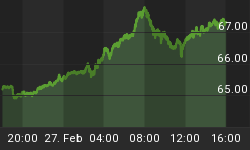We now live in a phony economic world where central bankers rule without check. Any hint of weakening data, which is actually a sign of reality and healing returning to the economy, is quickly met with the promise of more disastrous money printing. Last week we saw U.S. factory orders down and initial jobless claims rise. In Europe, we saw the Spanish bank bailout fall flat on its face and interest rates spike in Spain and Italy. Therefore, in predictable fashion, financial markets soared on the premise that the ECB and Fed must imminently ride to the rescue once again.
Meanwhile, most Main Stream Economists are auditioning for a role with the Weather Channel by blaming the persistently weak economic data on a warmer than typical winter. However, in truth the faltering global economy is resulting from a massive accumulation of debt that has led to a recession/depression in Europe. The same situation will inevitably cause a recession in the U.S., which will continue to cause a reduction in the growth rate of GDP in emerging markets.
But an endless increase in central banks' balance sheets can never be the answer to the malaise we find ourselves in, nor will there be any bailout coming for Europe other than the viability that can eventually arrive out of a cathartic depression.
Don't look for Germany to bailout Europe either. The country will never abdicate its sovereignty to profligate nations and assume the average borrowing costs of southern Europe on their debt. The U.S. shouldn't advise Germany to adopt fiscal unity in Europe unless Treasury Secretary Geithner also thinks it's a good idea to allow Greece the authority to issue T-Bills. Unless they are given complete control of the PIIGS spending and taxing authority, the Germans will most likely abandon their parenting role in Europe in due course.
The only real solution for insolvent Europe is to explicitly default on the debt to a level that brings PIIGS countries to a debt to GDP ratio below 60%. Then to pass balanced budget amendments and adopt tax and regulation reforms that makes them competitive with the rest of the world. Also, they need to adhere to the other strictures of the Maastricht treaty and not fall into the temptation of abandoning the Euro. Their economies will suffer a short depression, but this plan is the least painful option.
Having Greece return to the Drachma and defaulting on their debt through devaluation and money printing is a much worse option. Many are proposing that Greece now leave the Euro and inflate their way out of debt; just like Argentina did during 2002. However, this ignores the fact that the Argentines first defaulted on $100 billion of their external debt before removing their currency's peg to the U.S. dollar. Even though the Peso lost about 75% of its value and caused a brief bout with high inflation, the Argentine central bank did not have to monetize its debt. Therefore, the amount of new money printed was greatly reduced and resulted in a quick rebound in the economy.
In sharp contrast, the Europeans, Japanese and Americans still cling to the idea that inflation is the answer. PIIGS countries are pursuing an inflationary default that will increase borrowing costs and lead to a depression that will be far worse than if they simply admitted their insolvency and defaulted outright. Devaluing your currency to pay foreign creditors leads to hyperinflation and complete economic chaos. Paying off your debt by printing money was tried in Hungary during 1946 and Germany in 1923, but it resulted in complete devastation and hyperinflation.
If the Eurozone economies persist in the belief that the ECB can restore solvency to bankrupt nations, the Euro could fall back to parity with the dollar within the next 16 months. And if such central bank arrogance persists, the Euro could eventually go the way of the Hungarian Pengo.
Mr. Draghi should acknowledge that money printing hasn't fixed Europe's interest rates or economy.
Our central bank suffers from the same hubris as its European counterpart. Bernanke believes a deflationary recession must be avoided at all costs and that prosperity can be found in a printing press. The U.S. already has a higher debt to GDP ratio than EU (17) and is growing that debt at an unsustainable 8% of GDP per annum. Therefore, if America doesn't remove her addictions to borrowing and printing money, our own sovereign debt and currency crisis can't be more than a few years away.















